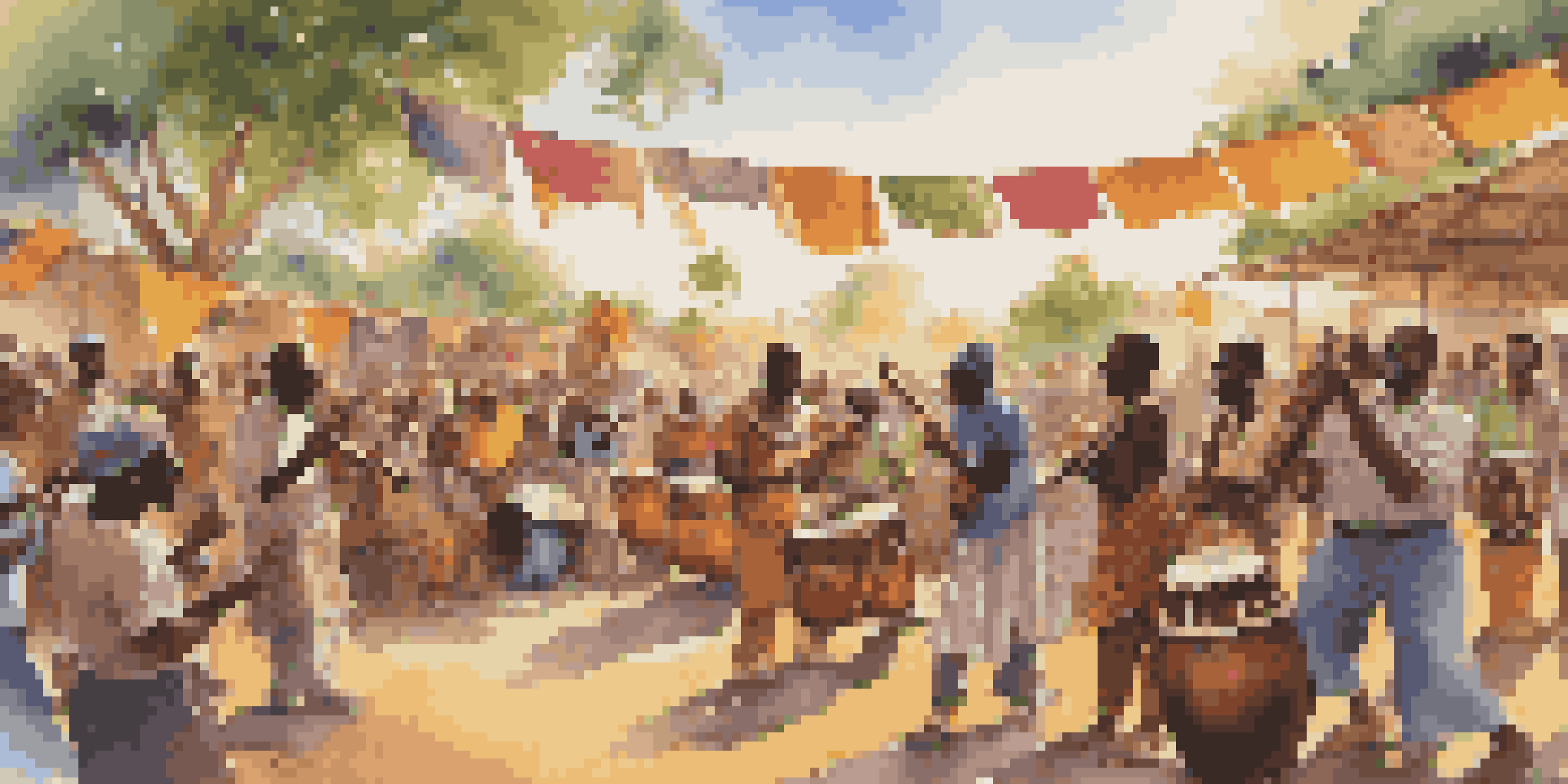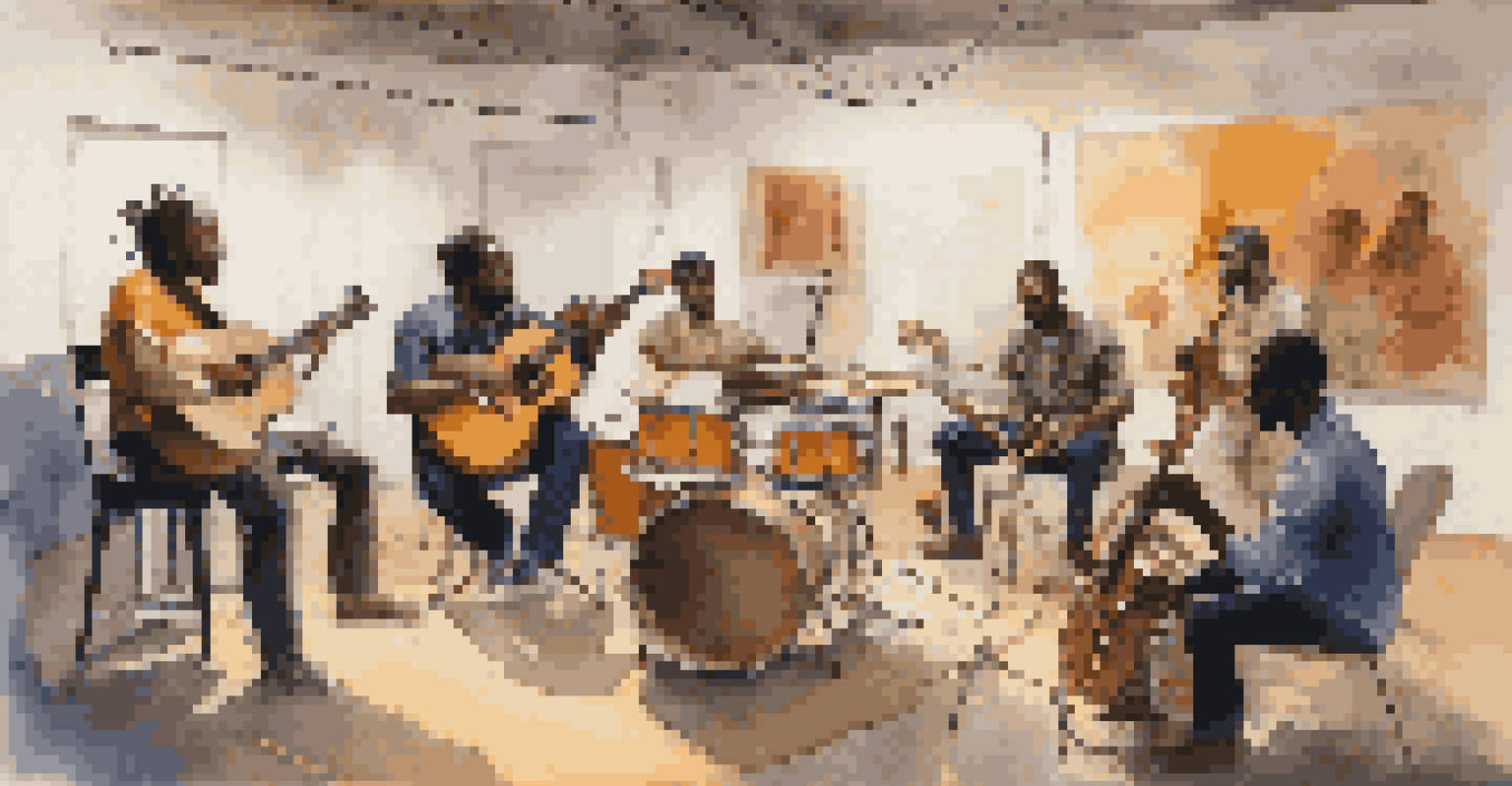The Influence of Globalization on Music Genres in Africa

Understanding Globalization in the Context of Music
Globalization refers to the interconnectedness of cultures through trade, technology, and communication. In music, this means a blend of global influences that can reshape local sounds. For African music, globalization has opened doors to collaboration with international artists, introducing new styles and techniques.
Music can change the world because it can change people.
As African musicians gain access to global platforms, their music can reach audiences far beyond their home countries. This exposure often leads to a fusion of traditional sounds with modern genres, creating unique interpretations that resonate with diverse audiences. The Internet and social media have played crucial roles in this transformation, allowing artists to share their work widely.
However, while globalization offers opportunities, it can also pose challenges. The risk of cultural homogenization looms, where distinct sounds may be diluted in favor of more mainstream appeal. Balancing global influences with authentic local traditions is vital for preserving the rich musical heritage of Africa.
The Rise of Afrobeat and its Global Appeal
Afrobeat, a genre that blends traditional African rhythms with jazz, funk, and highlife, has gained immense popularity worldwide. Originating from Nigeria in the 1960s, it was pioneered by artists like Fela Kuti. The genre's infectious grooves and socially conscious lyrics resonate with listeners across the globe, showcasing the power of African music.

With the advent of streaming platforms, Afrobeat has found its way into mainstream music charts, influencing artists from different genres. Collaborations with international stars like Beyoncé and Drake have further elevated the genre's profile, proving that African music can hold its own on the global stage. These partnerships often lead to a rich exchange of ideas and styles.
Globalization Shapes African Music
Globalization allows African musicians to blend traditional sounds with modern influences, enhancing their reach and creativity.
As Afrobeat continues to evolve, it remains rooted in its cultural origins while embracing new influences. This dynamic interplay illustrates how globalization can enhance, rather than overshadow, traditional music forms. The genre serves as a testament to the creativity and resilience of African musicians in an ever-changing musical landscape.
Influence of Hip Hop on African Music Scenes
Hip hop, born out of the streets of the United States, has made significant inroads into African music. With its compelling beats and powerful narratives, hip hop resonates with many young Africans who use it as a medium for self-expression. This genre allows artists to address social issues, political struggles, and personal experiences in a way that is both relatable and impactful.
The great thing about music is that it transcends language.
In countries like South Africa, Kenya, and Nigeria, local hip hop artists have infused their music with indigenous languages and rhythms, creating a sound that is uniquely African. This blending of styles not only preserves cultural identity but also fosters a sense of pride among listeners. As a result, hip hop has become a powerful tool for social change and community engagement.
Moreover, the global hip hop community has embraced African artists, leading to collaborations that further enrich the genre. Through these connections, African musicians can share their stories and experiences, fostering a deeper understanding of their cultures. The impact of hip hop on African music exemplifies how globalization can facilitate meaningful exchanges across borders.
The Role of Technology in Music Globalization
Technology is a driving force behind the globalization of music, particularly in Africa. With the rise of smartphones and social media, artists can now record, produce, and distribute their music from virtually anywhere. This accessibility has democratized the music industry, allowing independent musicians to showcase their talents without the need for major label backing.
Platforms like YouTube, Spotify, and SoundCloud have become vital for African artists, enabling them to reach global audiences. These tools not only help in building a fanbase but also facilitate collaborations with musicians from different parts of the world. Technology has thus transformed the traditional music landscape, making it more inclusive and diverse.
Afrobeat's Worldwide Popularity
Afrobeat combines African rhythms with global genres, significantly rising in popularity through collaborations with international artists.
However, the reliance on technology also presents challenges, such as the need to navigate copyright issues and the saturation of content. Artists must find creative ways to stand out in a crowded market while maintaining their unique sound. Ultimately, technology serves as both a catalyst for growth and a hurdle to overcome in the global music arena.
Preserving Cultural Identity Amidst Global Influences
As African music genres evolve under the influence of globalization, the preservation of cultural identity remains a critical concern. Many artists strive to honor their roots by incorporating traditional instruments and themes into their work. This blending of old and new not only enriches their sound but also keeps cultural narratives alive for future generations.
Local music festivals and cultural events play a significant role in celebrating African heritage, showcasing traditional music alongside modern interpretations. These gatherings provide a platform for artists to connect with their communities, fostering a sense of belonging and pride. By prioritizing cultural heritage, musicians can ensure that their work reflects both contemporary influences and historical significance.
Moreover, educational initiatives aimed at teaching younger generations about traditional music can help safeguard these rich legacies. As globalization continues to shape the music landscape, the focus on cultural preservation becomes increasingly important. Striking a balance between innovation and tradition will be key to maintaining Africa's diverse musical tapestry.
Collaboration and Cross-Cultural Exchange in Music
Collaboration between African artists and musicians from around the world has become a hallmark of globalization in music. This cross-pollination of ideas often leads to exciting new genres and styles, creating a vibrant musical landscape. For instance, the fusion of reggae and traditional African beats has given rise to unique sounds that appeal to a wider audience.
These collaborations often highlight shared experiences and themes, fostering understanding and empathy between cultures. Artists can bring their unique perspectives to the table, enriching the musical narrative while bridging cultural divides. This exchange not only broadens artistic horizons but also creates a sense of global community.
Technology Empowers Musicians
Advancements in technology have democratized the music industry, enabling African artists to produce and share their work globally.
Furthermore, international music festivals have become melting pots of cultural exchange, where artists from different backgrounds come together. Such events celebrate diversity and encourage collaborations that may not have occurred otherwise. The influence of globalization is evident in the way music continues to evolve through these interactions, creating a dynamic and interconnected world of sound.
The Future of African Music in a Globalized World
As globalization continues to influence music, the future of African genres looks promising yet complex. With the rise of digital platforms, African artists have unprecedented opportunities to share their music globally. This access can lead to greater recognition and appreciation of African sounds, but it also comes with the challenge of staying true to their roots.
Emerging technologies, such as virtual reality and artificial intelligence, are set to reshape the music industry further. These innovations could create new avenues for expression and engagement, allowing artists to reach audiences in innovative ways. Embracing these changes while preserving cultural identity will be crucial for the sustainability of African music.

Ultimately, the future of African music lies in the hands of its artists, who must navigate the delicate balance between global influences and local traditions. By remaining authentic and true to their heritage, they can continue to make significant contributions to the global music scene while celebrating the rich diversity of their cultures.